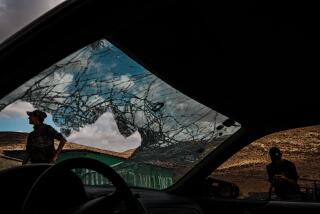Killings in Iraq raise fears of renewed sectarian violence
Reporting from Baghdad — It was after dark when the men in uniform entered the first home. There they found three men and shot them using silencers. Then they stole the victims’ van and drove to the next house and killed again. Within an hour, the gunmen had methodically made their way through four homes and killed 25 people.
Their work done, they left on foot Friday evening, disappearing into the palm trees and orange groves of the Hawr Rajab district south of Baghdad.
Many of the victims had been part of the U.S.-backed Awakening movement, Sunni Arab paramilitary groups that took a stand against the militant group Al Qaeda in Iraq and played a key role in the 2007 American troop buildup to fight the insurgency. But three women and two girls were also among the dead, according to accounts from residents and security officials.
On Saturday, people in the isolated villages south of the capital locked themselves in their homes after the attack, which echoed the darkest days of civil war and raised concern that the country’s deadlock over forming a government could provoke a renewal of sectarian bloodshed.
The elections last month polarized the country, with Shiite Prime Minister Nouri Maliki refusing to accept that an alliance led by rival Iyad Allawi, favored by Sunnis, had won more parliamentary seats than his bloc had. Some Iraqi security officers, U.S. military personnel and Western officials are expressing concern that Al Qaeda in Iraq could reestablish itself on Baghdad’s rural perimeter and cause havoc before the next government is formed.
The attack Friday appeared to be aimed at intimidating the Sunni population. Residents of Hawr Rajab said the attackers, wearing American-style military uniforms, arrived in the afternoon. They seized an abandoned home, and one of the men, pretending to be an interpreter, told villagers in a mix of English and Arabic that the “American soldiers” were on a mission.
Some witnesses said the men’s guns had laser pointers.
The carnage reminded some of the arbitrary killings during the rule of Al Qaeda in Iraq in the so-called Baghdad belt. For others, the events conjured up memories of uniformed Shiite militiamen busting down doors and dragging away Sunni men.
“All of the people here are terrified. We don’t know what’s going to happen at night. We are going to lock our doors and stay inside. Only God can help us,” Hawr Rajab resident Hadi Hamid Abbas said. “I am lost and I don’t know who to accuse.”
The killings were a gruesome example of the dread that has descended on the rich farmland that girdles the southern edges of the capital.
Only a hard-fought campaign in 2007 and ’08 by the Awakening groups and the Americans rid the area of Al Qaeda in Iraq’s enclaves. But the promise of incorporating the fighters, many of them former insurgents, into the security forces dissolved when the program was handed over to the Iraqi government in late 2008 and most Sunni fighters were moved into civil ministries.
Now, as the U.S. military is planning to draw down to 50,000 troops by the end of August and the Iraqi government is arresting some senior tribal and Awakening leaders, residents are afraid. With trust in the forces of the Shiite-led government almost nonexistent, rural Sunni communities believe that they are at the mercy of Al Qaeda in Iraq.
An Iraqi officer predicted that the militant group would seek to exploit the absence of key Sunni leaders caught up in the government’s sweeps.
“It will be used by gunmen to attack this side or that side and the security forces. Also, such issues will make the trust between the people and the security forces disappear,” said the officer, who insisted on anonymity because of the sensitivity of the topic. “If such situations continue, I would not exclude civil war.”
U.S. military officers have received tips that Al Qaeda in Iraq is offering communities with former Awakening fighters the possibility of “forgiveness” in return for havens from Iraqi forces.
“This is a good opportunity for Al Qaeda to come back,” one U.S. officer said.
In Hawr Rajab, residents say there are too few army checkpoints now that the Awakening program in effect has been disbanded, removing its fighters from the streets and with them a measure of security. And last spring, security forces from Baghdad had also detained Hawr Rajab’s top Awakening member.
Mustafa Kamal Shibeeb, the onetime commander of all the Awakening forces for the Dura area, which includes Hawr Rajab, said Al Qaeda in Iraq was taking advantage of the situation.
“In that village, no one was present. During the days of the Awakening, we had 200 men protecting that area,” Shibeeb said. “I advised the government over and over to keep the Awakenings until the election, and now I can’t do anything. I feel helpless.”
The commander worries about fighters with Al Qaeda in Iraq, but he has other problems. In early November, government security forces arrested him in connection with killings while his men were fighting Al Qaeda in Iraq in 2007.
After he was released, a government body barred him from running for parliament. It accused him of being a high-ranking member of Saddam Hussein’s Baath Party, despite the fact that the old regime had executed some of his immediate relatives.
“I don’t have the power or capability to protect the region or people,” Shibeeb said. “Maybe I can protect myself, and maybe, in the end, I can’t even protect myself.”
The commander said he hopes to leave Iraq as soon as his children finish their school semester this spring.
Last fall, U.S. officers worried about the effect of losing prominent leaders such as Shibeeb. One officer stationed in the area said it would send a bad message to the local population about how those who fought Al Qaeda in Iraq are treated.
The fear and helplessness are felt across the Baghdad belt. Residents of the town of Abu Ghraib last week described themselves as being hounded by the Iraqi army and attacked by Al Qaeda in Iraq.
“Even if we don’t have weapons, we will carry our knives,” a man said, angry about the recent arrests of Awakening leaders, including one last week.
A woman mocked him. “Talk with reality. You won’t even hold a demonstration now because you are afraid of getting arrested,” said the woman, who, like the man, did not want to be identified for fear of being targeted.
The man looked sheepish, and with his smile acknowledged that she was right. They were too tired to fight.
He voiced the viewpoint of many Sunnis who fought Al Qaeda in Iraq and now feel clobbered by the military.
“We just want a leader who will not sneak up on us while we sleep to arrest us. We want someone who will provide us security.”
Ahmed is a Times staff writer.
More to Read
Sign up for Essential California
The most important California stories and recommendations in your inbox every morning.
You may occasionally receive promotional content from the Los Angeles Times.










